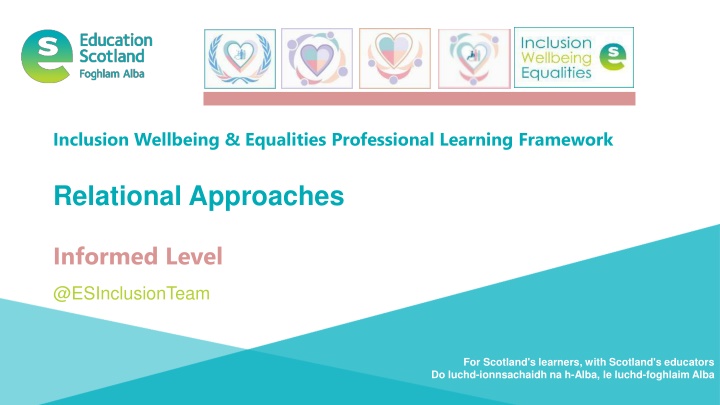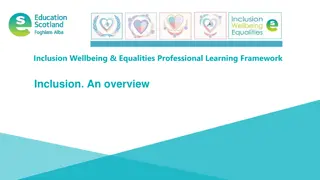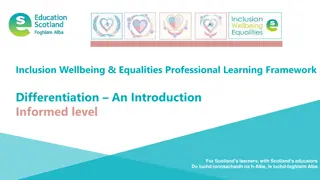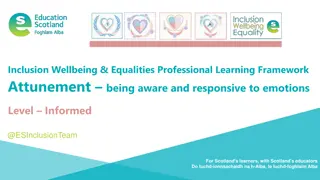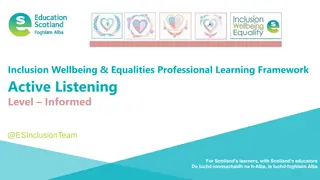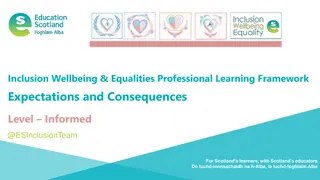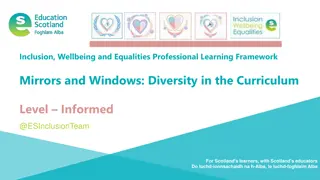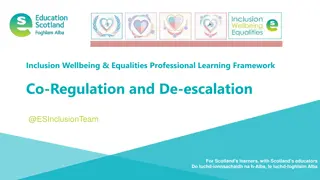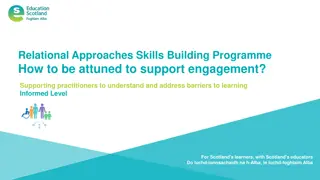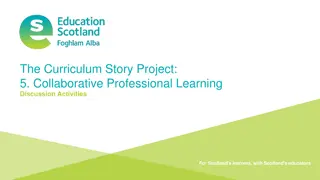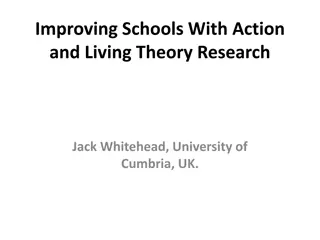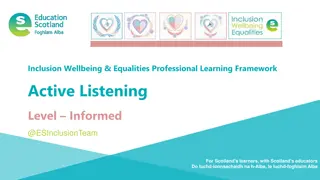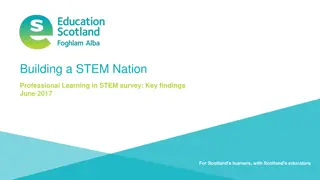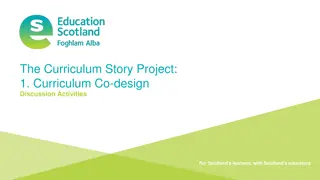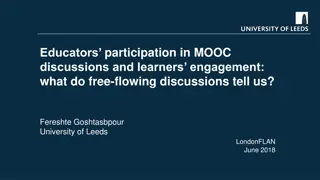Professional Learning Framework for Scotland's Educators
This professional learning framework aims to enhance the knowledge and understanding of educators in Scotland regarding inclusion, wellbeing, and equalities. It provides slides with facilitation notes for group or self-directed learning activities, focusing on relational approaches in educational settings. The resource emphasizes the importance of ethos, culture, and values-based practices in promoting strong relationships and positive behavior among learners. It encourages facilitators to create a safe space for reflection and discussion to support continuous professional development for Scotland's educators.
Download Presentation

Please find below an Image/Link to download the presentation.
The content on the website is provided AS IS for your information and personal use only. It may not be sold, licensed, or shared on other websites without obtaining consent from the author.If you encounter any issues during the download, it is possible that the publisher has removed the file from their server.
You are allowed to download the files provided on this website for personal or commercial use, subject to the condition that they are used lawfully. All files are the property of their respective owners.
The content on the website is provided AS IS for your information and personal use only. It may not be sold, licensed, or shared on other websites without obtaining consent from the author.
E N D
Presentation Transcript
Inclusion Wellbeing & Equalities Professional Learning Framework Relational Approaches Informed Level @ESInclusionTeam For Scotland's learners, with Scotland's educators Do luchd-ionnsachaidh na h-Alba, le luchd-foghlaim Alba For Scotland's learners, with Scotland's educators Do luchd-ionnsachaidh na h-Alba, le luchd-foghlaim Alba
Interconnectivity For Scotland's learners, with Scotland's educators Do luchd-ionnsachaidh na h-Alba, le luchd-foghlaim Alba
How to use this resource These slides can be used to facilitate professional learning in a group or whole-setting, or as a self-directed learning activity as an individual. Facilitation notes are included at the bottom of each slide. Please do not remove or change any of the slides included. Facilitators are welcome to add slides or activities relevant to your own setting, to support discussion and exploration of the topic. Facilitators will know their participants needs best. Anyone who works in an educational setting can be a facilitator and use these slides. For reflection or discussion activities, it is important to establish a safe space which encourages respect and honesty to ensure that everyone is able to participate. For Scotland's learners, with Scotland's educators Do luchd-ionnsachaidh na h-Alba, le luchd-foghlaim Alba
National Model for Professional Learning This professional learning resource will support you to deepen your knowledge and understanding. You will have the opportunity to consider how to take this learning forward on your own and with others. The National Model of Professional Learning (education.gov.scot) For Scotland's learners, with Scotland's educators Do luchd-ionnsachaidh na h-Alba, le luchd-foghlaim Alba
Welcome This session provides an opportunity to: To explore the importance of ethos, culture, and values-based practice To explore ethos and culture that promotes strong trusting relationships and positive behaviour To explore a range of relational approaches used in educational settings For Scotland's learners, with Scotland's educators Do luchd-ionnsachaidh na h-Alba, le luchd-foghlaim Alba
The Power of Relationships 3: 40 mins If you are viewing tis as a PDF click the link to access the film https://youtu.be/kzvm1m8zq5g For Scotland's learners, with Scotland's educators Do luchd-ionnsachaidh na h-Alba, le luchd-foghlaim Alba
Ethos, Culture, and Values A positive school ethos and culture is essential to developing good relationships and positive behaviour in the classroom, playground and wider community. Policy Guidance 2018 Ethos and culture is created by, and reflect, a learning communities VALUES Values Behaviour Drive For Scotland's learners, with Scotland's educators Do luchd-ionnsachaidh na h-Alba, le luchd-foghlaim Alba
For example, behaviour driven by values looks like: listening, with purpose understanding and responding to behaviour (in a developmentally friendly and holistic way) An attitude of caring, acceptance, and support of a person regardless of what the person says or does showing unconditional positive regard embracing qualities such as open-mindedness, kindness, empathy, and perseverance understanding and managing our own emotions (and helping others to do this too) being proactive in supporting needs wellbeing, social and emotional, and learning modelling the behaviour we wish to see For Scotland's learners, with Scotland's educators Do luchd-ionnsachaidh na h-Alba, le luchd-foghlaim Alba
Ethos, Culture, and Values-Based Practice Everyone in an educational setting contributes towards the ethos and culture To create an ethos and culture based on VALUES and positive trusting relationships requires: TIME to discuss and agree on a set of shared values TIME and opportunity to get to know learners, parents, and colleagues TIME and opportunity to: reflect on practice extend knowledge, understanding and confidence refine skills - to be more effective in practice become familiar with practical strategies to support relationships and behaviour, for example, nurturing, restorative, and solution-oriented approaches For Scotland's learners, with Scotland's educators Do luchd-ionnsachaidh na h-Alba, le luchd-foghlaim Alba
Relational Approaches: to improving positive relationships and behaviour A whole school approach to positive relationships and behaviour is the most effective way of supporting wellbeing for children and young people. This is supported by a wealth of evidence that links culture and ethos with wellbeing as well as attainment. Included, Engaged and Involved part 2: preventing and managing school exclusions, p47 For Scotland's learners, with Scotland's educators Do luchd-ionnsachaidh na h-Alba, le luchd-foghlaim Alba
Relational approaches Relationships Relationships Whole School Nurture Trauma- informed approaches Relationships Restorative Approaches Solution Oriented Schools Responsibility of All PSE and HWB Programmes Learner Participation Mentors in Violence Prevention Promoting Equality and Equity Recognising and Realising Children s Rights Relationships For Scotland's learners, with Scotland's educators Do luchd-ionnsachaidh na h-Alba, le luchd-foghlaim Alba
Being Rights Respecting: 2: 10 mins means developing a rights respecting ethos and culture involves more than learning about rights, it involves making rights real in every day practice involves listening to learners If you are viewing tis as a PDF click the link to access the film https://youtu.be/1DOPyjKSUxo For Scotland's learners, with Scotland's educators Do luchd-ionnsachaidh na h-Alba, le luchd-foghlaim Alba
For example this means: Recognising and realising Article 2 non-discrimination Means being aware and pro-active about affinity bias the increased likelihood that we form closer relationships with people like us For more information about unconscious bias see the PL modules on Rights and Equalities For Scotland's learners, with Scotland's educators Do luchd-ionnsachaidh na h-Alba, le luchd-foghlaim Alba
The Curriculum CfE Health and Wellbeing Learning in health and wellbeing ensures that children and young people develop the knowledge and understanding, skills, capabilities and attributes which they need for mental, emotional, social and physical wellbeing now and in the future. For Scotland's learners, with Scotland's educators Do luchd-ionnsachaidh na h-Alba, le luchd-foghlaim Alba
Nurturing Approaches Learning is understood developmentally Has experience impacted brain development Think stage not age Transitions are important in children s lives Nurture is important for wellbeing Play is important at all ages Nurture Principles Language is a vital means of communication Environment offers a safe Base All behaviour is communication For Scotland's learners, with Scotland's educators Do luchd-ionnsachaidh na h-Alba, le luchd-foghlaim Alba
Trauma Informed Practice: Optional NHS Education Service Film - 2: 10 mins recognises different types of trauma and acknowledges that trauma is common recognises the signs of trauma and responses include: making others feel safe being someone that can be trusted If you are viewing tis as a PDF click this link to access the film offering choices and control in situations when someone feels unsafe Nurture and trauma-informed approaches A summary of supports and resources showing compassion and not judgement Keeping Trauma in Mind A professional learning programme working with others to provide holistic help and support Compassionate and Connected Communities A professional learning activity focussing on strengths and not deficits For Scotland's learners, with Scotland's educators Do luchd-ionnsachaidh na h-Alba, le luchd-foghlaim Alba
Restorative Approaches: recognises that people are the experts of their own solutions and if implemented effectively will promote accountability and maximise personal responsibility provides a framework of values, thinking and language that is helpful when something needs to be restored can be proactive (relationship building) or responsive (relationship repairing) and can be used at every level from everyday informal interactions to more formal restorative meetings can be demonstrated by everyone through their values and language Hierarchy of Restorative Approaches Restorative approaches to support positive relationships and behaviour INTENSIVE (Repairing harm) Restorative: Justice, Conferences, & Meetings TARGETED (Managing difficulties and disruption) Restorative conversations: informal and formal Problem-solving circles UNIVERSAL (Developing social and emotional capacity) At Home In Classrooms and Educational Settings In Community Settings Restorative pedagogy: Social skills learning Building social confidence and a sense of social responsibility Identifying and addressing what everyone needs Restorative values, thinking, and language evident in practice Focus on relationships and social/community cohesion For Scotland's learners, with Scotland's educators Do luchd-ionnsachaidh na h-Alba, le luchd-foghlaim Alba
Solution-Oriented Approaches: develop goals and solutions rather than just exploring problems focus on the present and the future, rather than the past strength-based rather than deficit-based to identify the skills, strengths and resources and find their own solutions build capacity for effective problem solving and reflective practice contribute to positive relationships, understanding and connections, and recognising what influences behaviour Source: Solutions Focused Therapy Sfbt Solution Focused For Scotland's learners, with Scotland's educators Do luchd-ionnsachaidh na h-Alba, le luchd-foghlaim Alba
Mentor in Violence Prevention (MVP) Programme: gives young people the opportunity to explore and challenge the attitudes, beliefs and cultural norms that underpin gender-based violence, bullying and other forms of violence trains Senior pupils to become young leaders who support and mentor younger learners explores behaviours including bullying, name-calling, sexting, controlling behaviour and harassment uses the bystander approach to empower both male and female pupils to support and challenge peers and to be active in preventing violence in a safe way is most effective as a whole school approach helping young people to stay safe and support each other fits well with Curriculum for Excellence health and wellbeing experiences and outcomes and the national approach to promoting positive relationships and behaviour in educational settings encourages positive healthy relationships amongst peers For Scotland's learners, with Scotland's educators Do luchd-ionnsachaidh na h-Alba, le luchd-foghlaim Alba
Reflection From what you have learned so far, think about: How has this made you feel? What has this made you think about? What one action would you like to take forward? How can you link what you plan to do with others in your setting? How you will know that this learning has made a difference? For Scotland's learners, with Scotland's educators Do luchd-ionnsachaidh na h-Alba, le luchd-foghlaim Alba
Resources and Information to help For Scotland's learners, with Scotland's educators Do luchd-ionnsachaidh na h-Alba, le luchd-foghlaim Alba
We value your feedback From now until March 2024 we will be taking feedback on these resources so that we can make changes in advance of a formal launch of the Professional Learning Framework in June 2024 Your feedback could help us improve this resource Please complete this short form, using the link or QR code, to let us know what you thought of it and any suggestions you have on how it could be improved LINK: https://forms.office.com/e/b5PCpJJJ3P For Scotland's learners, with Scotland's educators Do luchd-ionnsachaidh na h-Alba, le luchd-foghlaim Alba
Education Scotland Denholm House Almondvale Business Park Almondvale Way Livingston EH54 6GA T +44 (0)131 244 5000 E enquiries@educationscotland.gsi.gov.uk For Scotland's learners, with Scotland's educators Do luchd-ionnsachaidh na h-Alba, le luchd-foghlaim Alba For Scotland's learners, with Scotland's educators Do luchd-ionnsachaidh na h-Alba, le luchd-foghlaim Alba
